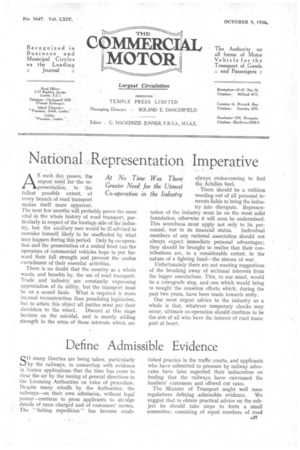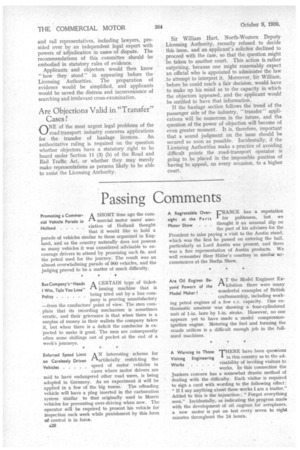Define Admissible Evidence
Page 29

Page 30

If you've noticed an error in this article please click here to report it so we can fix it.
SO many liberties are being taken, particularly by the railways, in connection with evidence in licence applications that the time has come to clear the air by the issuing of general directions to the Licensing Authorities on rules of procedure. Despite many rebuffs by the Authorities, the railways—on their, own admission, without legal power—continue to press applicants to divulge details of rates charged and of customers' names. The "fishing expedition" has become estab lished practice in the traffic courts, and applicants who have submitted to pressure by railway advocates have later regretted their indiscretion on finding that the railways have canvassed the hauliers' customers and offered cut rates.
The Minister of Transport might well issue regulations defining admissible evidence. We suggest that to obtain practical advice on the subject he should take steps to form a small committee, consisting of equal numbers of road and rail representatives, including lawyers, presided over by an independent legal expert with powers of adjudication in cases of dispute. The recommendations of this committee should be embodied in statutory rules of evidence.
Applicants and objectors would then know "how they. stood" in appearing before the Licensing Authorities. The preparation of evidence would be simplified, and applicants would be saved the distress and inconvenience of searching and irrelevant cross-examination.
Are Objections Valid in "Transfer 11 Cases?
,nNE of the most urgent legal problems of the road transport industry concerns applications for the transfer of haulage licences. An authoritative ruling is required on the question whether objectors have a statutory right to be heard under Section 11 (3) (b) of the Road and Rail Traffic Act, or whether they may merely make representations as persons likely to be able to assist the Licensing Authority. Sir William Hart, North-Western Deputy Licensing 'Authority, recently refused to decide this issue, and an applicant's solicitor declined to proceed with the case, so that the question might be taken to another court. This action is rather surprising, because one might reasonably expect an official who is appointed to administer the law to attempt to interpret it. Moreover, Sir William, before he could reach a fair decision, would have to make up his mind as to the capacity in which the objectors appeared, and the applicant would be entitled to have that information.
If the haulage section follows the trend of the passenger side of the industry, " transfer " applications will be numerous in the future, and the question of the power of objection will become of even greater moment. It is, therefore, important that a sound judgment on the issue should be secured so soon as possible. Incidentally, if the Licensing Authorities make a practice of avoiding difficult points the road-transport operator is going to be placed in •the impossible position of having to appeal, on every occasion, to a higher court.




























































































